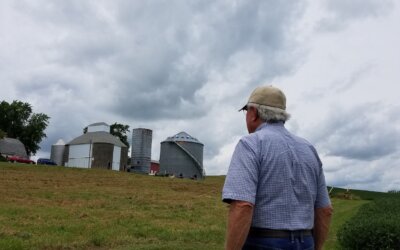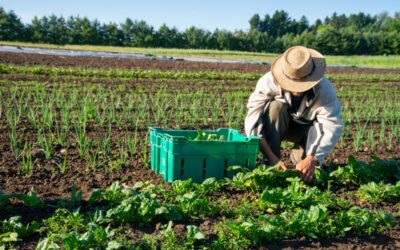
Photo courtesy of Catch Des Moines via Facebook
NEED TO KNOW:
- Rural leaders are organizing for change. A coalition from across the country met in Des Moines in April to address unique challenges facing rural communities.
- The summit highlighted community-driven solutions that are working in rural areas—like residents coming together to stop a utility rate hike or establish paid family leave.
- Attendees said they were frustrated with the growing influence of the ultra-wealthy in politics, and called for policies that ensure corporations and the rich pay their fair share.
- Rural leaders urged state and federal elected officials to invest in rural infrastructure, protect public institutions, and prioritize the realities of rural America.
While the Trump administration and Republicans around the country are weighing how much they’re going to cut health care and education, rural leaders and advocates gathered in Des Moines to discuss how to actually improve people’s lives.
The 2025 Rural Policy Action Summit, held in April, had people from over 50 organizations across the country gather in Iowa. Participants noted the resourcefulness, ingenuity, and commitment of people in rural communities and small towns. They called for federal and state governments to remove barriers and invest in our communities, and expressed frustration about corporate consolidation and the undue influence of the ultrawealthy.
“The backdrop to our meeting is that the current leadership in DC is trying to give more lavish tax breaks to the wealthy and corporations and pay for them with devastating cuts to our healthcare and education, breaking contracts with small farmers, giving away public land, and gutting programs that support rural people,” said Sarah Jaynes of the Rural Democracy Initiative. “We’re convening the Rural Policy Action Summit so rural people can shape the decisions about the places we call home.”
The event was hosted by Rural Democracy, in collaboration with the Iowa Citizens for Community Improvement, the American Federation of Teachers, Black Appalachian Coalition, Native Organizers Alliance, Northern Plains Resource Council, State Innovation Exchange, and Wisconsin Farmers Union.
Attendees called on federal and state governments to invest in communities, and expressed a shared frustration regarding corporate consolidation and how much influence the most wealthy individuals have on US politics.
A key topic at the 2025 summit was solutions for working families, by working families. People at the event shared stories of successful community-driven campaigns that had improved lives—like a push to stop exorbitant utility rate hikes in Montana, establish paid family leave in Missouri, and protect a nursing home in Wisconsin.
Building on this momentum, participants spoke to the importance of advancing federal policy to ensure a safe work environment and other policies that support working families. Across sessions, speakers shared stories of rural people’s determination and commitment.
“Rural people are leading with creativity, grit, and vision,” said Caitlin Cromwell, director of organizing at the Northern Plains Resource Council. “The summit showed what’s possible when we come together to share what’s working and fight for the future we all deserve.”
Conversations about resilience and community investment echoed throughout the summit. People from sovereign Tribal nations spoke to the unique needs and opportunities for sovereign nations. Many Tribal nations are the key driver for the regional economy and have used their power to protect public resources that benefit everyone, such as clean water. Yet, Native Americans are facing attacks on their treaty rights, and the Trump administration has called for taking away their voting rights.
In sessions covering topics from “Land, Labor, and Rural Belonging” to “Prioritizing in a Time of Chaos,” participants called for policies that return power and resources to rural communities.
“In conversations with farmers, small business owners, and union members, a common concern stood out,” said Melissa Cropper, president of the Ohio Federation of Teachers. “Too often, the rules are rigged in favor of massive corporations and the ultra-wealthy.”
“Rural communities rely on strong labor protections and public institutions—our hospitals, our schools—to thrive. We need public investment that strengthens rural infrastructure, safeguards good union jobs, and stops the wave of privatization and closures that threaten the very heart of our communities.”
Throughout the summit, leaders emphasized how policies must reflect the real conditions in rural places. For example, cuts to Medicaid or adding barriers to enrollment will lead to more people without health care. It will also further strain rural hospitals, causing hospital closures and job loss.
Siena Chrisman, Agriculture & Food Systems Research Director at State Innovation Exchange, said, “The gutting of critical programs at the federal level is further harming rural communities that have already seen decades of disinvestment. In this time of federal chaos, state policymakers can work alongside rural leaders to support investment in rural health care, education, farmland, and everything else that make rural communities great places to live and work. It’s critical to stop this downward spiral and put us on the right track.”
The 2025 summit was the third of its kind, following summits in 2021 and 2023. Both of those ended with the creation of rural policy action reports, which identify top rural policy priorities.
A 2024 rural poll found that 76% of respondents want rich people and corporations to pay their fair share to invest in working people.

Gwen Frisbie-Fulton: ‘The people closest to the problem are often the ones who can find the solution’
About two years ago, tents started to show up in my neighborhood along the creek beds and in small stands of trees. Most only became visible when...

A love letter to the working class, from Gwen Frisbie-Fulton
It started in the back seat of my family’s Jeep Cherokee, the one with the broken AC and vinyl seats that stuck to my thighs in the late summer...

Guest post: Elon Musk’s chainsaw comes for the farm
We can all agree that things should be efficient, but this is hardly that. This is chaos. March is finally here, and that means we’re chomping at...

Guest post: Stand against pipeline to protect Iowa’s natural resources
Iowa towns, farmland, and natural resources shouldn't be a playground for corporate power. I heard from fellow Iowa Citizens for Community...

Guest post: Forget Project 2025. We need a better Farm Bill
When it comes to farm policy in 2025, we don’t need Project 2025. We need a new Farm Bill that acknowledges the challenges we face, tackles them...

Guest post: Iowa needs to stop ignoring our clean water crisis
The Iowa Department of Natural Resources needs to come clean about our dirty water. Out here on the farm, we know things can break down and go...




